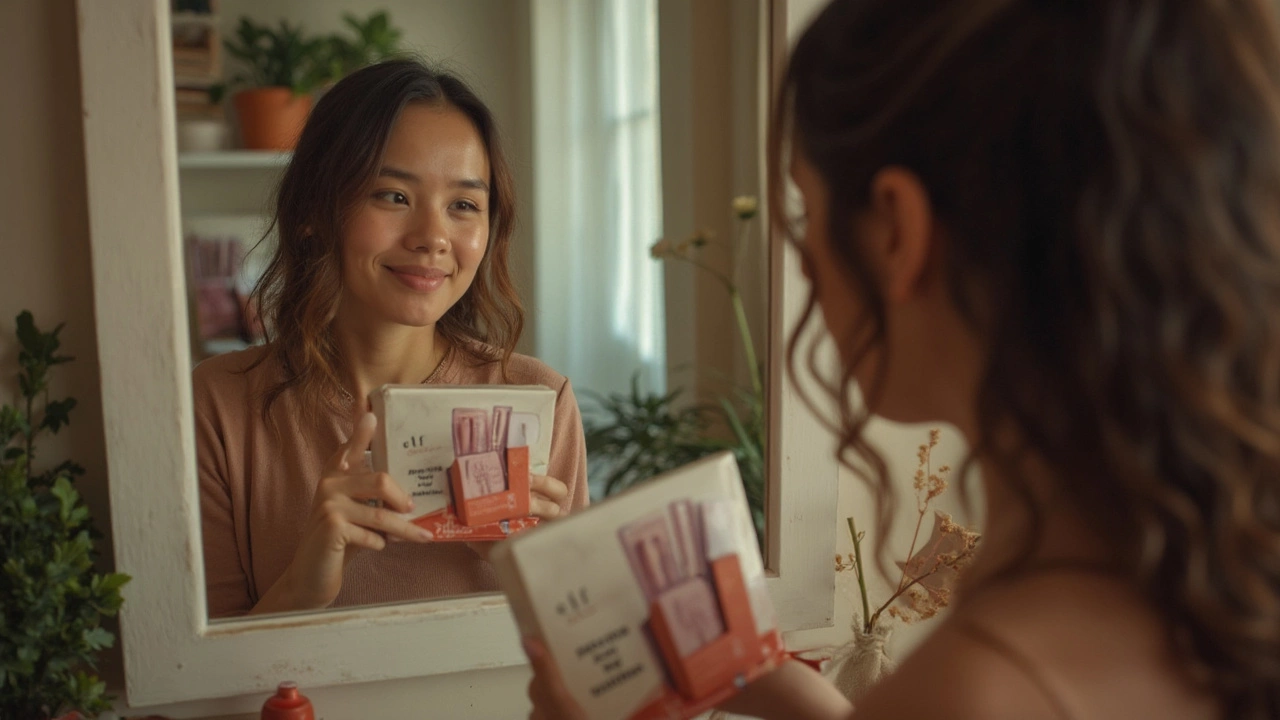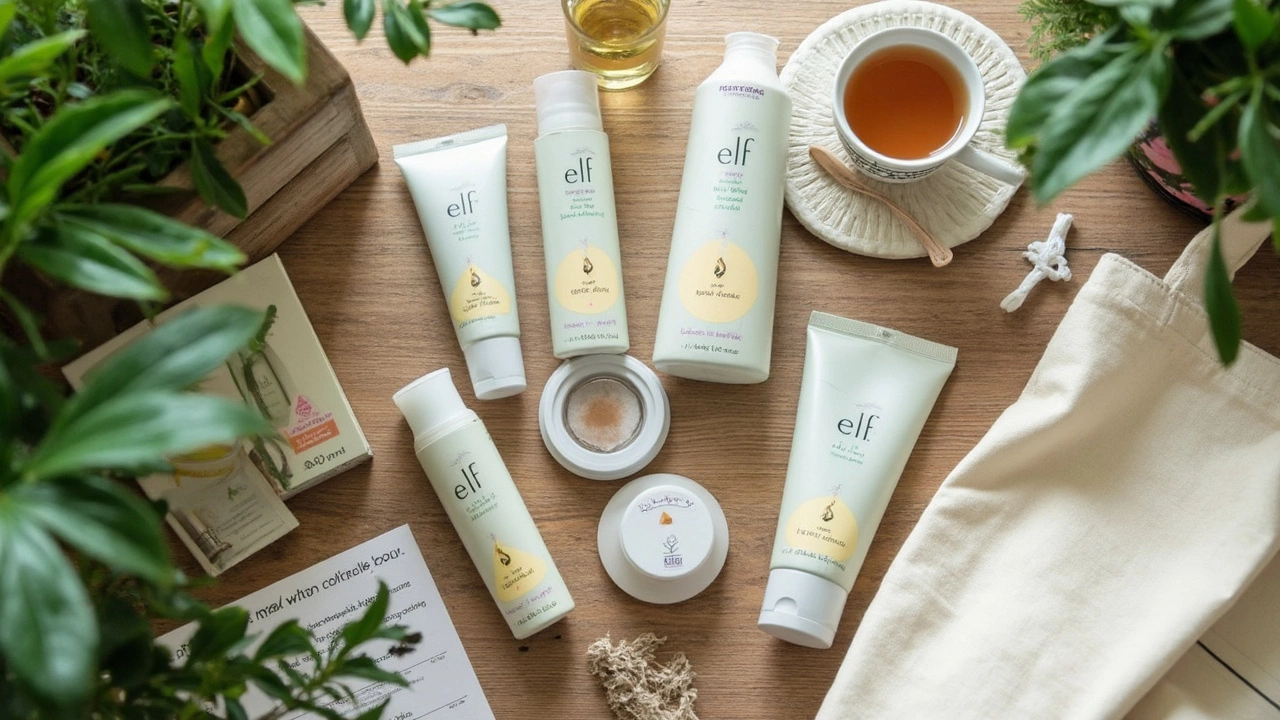You see 'cruelty-free' splashed on so many makeup products, but what does that even mean for your favorite brands? If you’ve ever bought Elf cosmetics thinking you’re making an ethical choice, you’re not alone—Elf has built its reputation on being accessible and animal friendly.
But let’s get real: not all ‘cruelty-free’ stamps mean the same thing. The beauty world can get a little shady about their buzzwords. So, before tossing that Elf blush in your cart, it helps to know exactly what you’re supporting. I’ll break down what Elf promises, what loopholes to watch for, and how you can check if your routine actually lines up with your values.
Stick around if you want to make choices that go beyond pretty packaging. It’s not just about looking good—it’s about feeling good about what you wear, too.
- What Does 'Cruelty-Free' Really Mean?
- Elf’s Animal Testing Policy: The Real Story
- Ingredients and Vegan Claims
- Sustainability and Transparency: Going Beyond Cruelty-Free
What Does 'Cruelty-Free' Really Mean?
It’s easy to assume that ‘cruelty-free’ means zero animal testing, but there’s a bit more to it. In beauty, cruelty-free means a brand doesn’t test its final products on animals, but here’s where things get complicated—some companies might not test the finished product but could still use ingredients that were tested on animals further upstream. Others pay third-parties to handle testing elsewhere. If a brand sells in places like mainland China, where animal testing has often been required for cosmetics, claims get even murkier.
When you see a bunny logo or a cruelty-free stamp, it’s usually a good sign, but not all certifications are created equal. Trustworthy options include Leaping Bunny and PETA’s Beauty Without Bunnies. These groups do the legwork—brands have to prove they don’t test on animals at any stage. A quick tip: check a brand’s website for their policy, and always look for third-party certification, not just self-claims.
And don’t get ‘vegan’ and ‘cruelty-free’ mixed up—they sound similar, but vegan refers to ingredient lists (no animal-derived stuff), while cruelty-free is all about animal testing. It’s possible for a product to be vegan but still tested on animals, so those labels aren’t interchangeable.
The bottom line is: if you want the real deal, look for full transparency from brands and those third-party stamps. Not every company claiming to be cruelty-free sticks to strict standards. Knowing these details helps you cut through the noise and find cruelty-free makeup that matches your ethical vibe.
Elf’s Animal Testing Policy: The Real Story
Elf is loud and clear about its animal testing policy: they do not test on animals—period. They don’t let anyone else test their finished products or ingredients on animals either, no matter where the products are sold. That’s a big deal, especially for folks looking for cruelty-free makeup that actually stands by its promises.
Back in 2004 when Elf first launched, they jumped right into the cruelty-free lane and have stuck to it ever since. Even now, as of 2025, they’re still listed as “cruelty-free” by both PETA and Leaping Bunny—the gold standard groups in this space. You can even spot their bunny logo on their packaging, which isn’t just for show; those certifications aren’t easy to get or keep.
Ever wondered why some brands can't claim a real cruelty-free status? It’s usually because they sell in mainland China, where animal testing can be required by law. Elf, though, avoids mainland China’s physical stores for this exact reason. They sell online to China, but those orders ship directly to customers, so there’s no forced animal testing.
Here’s a quick rundown of Elf’s animal testing facts:
- Certified by PETA and Leaping Bunny
- Never tests ingredients or finished products on animals
- Doesn’t sell in places that would legally require animal testing
- Regularly audited for compliance by cruelty-free organizations
For a side-by-side look, check out how Elf stacks up against others in the industry:
| Brand | Mainland China Sales | Cruelty-Free Certifications | Animal Testing Policy |
|---|---|---|---|
| Elf Cosmetics | No (online only, ships direct) | PETA, Leaping Bunny | No animal testing at any stage |
| Maybelline | Yes (in stores) | None | Required by law in some markets |
| Wet n Wild | No (ships online direct to China) | PETA | No animal testing |
| L'Oréal | Yes (in stores) | None | Follows local laws (tests when required) |
If you care about animal welfare, Elf’s record is tough to beat. Pro tip: look for both PETA and Leaping Bunny statuses next time you shop, because double certification means a brand’s really dedicated to cruelty-free practices.

Ingredients and Vegan Claims
Reading labels in the beauty aisle can be confusing. Elf cosmetics says all their products are 100% vegan, so you won’t find beeswax, carmine, lanolin, or any other animal-based ingredients in their makeup. That’s a pretty bold claim—especially in an industry where a lot of brands still use things like crushed beetles for red pigment or animal fats for creamy textures.
Here’s where Elf sets itself apart: they reformulated everything in 2016 to ditch all animal byproducts. So, if you pick up an Elf lipstick or foundation, it’s free from animal ingredients—no hidden surprises. Plus, they’re super transparent about what’s inside each product. You can check the full ingredient list right on their website before you buy.
When Elf says ‘vegan,’ they mean it. But sometimes companies can get sneaky about related issues—think palm oil or microplastics. Elf doesn’t claim to be fully natural, so you’ll spot some synthetic stuff (like certain pigments or silicones) in their formulas. But they avoid most of the big no-nos if you care about animal welfare.
- All products are certified vegan by PETA and Logical Harmony.
- No carmine (a red dye from insects) or beeswax, which is common in other makeup brands.
- Ingredient safety is checked against EU standards—which are often stricter than US rules.
For the data nerds, here’s a quick look at how Elf stacks up against some other big brands when it comes to animal ingredients:
| Brand | 100% Vegan? | Details |
|---|---|---|
| Elf cosmetics | Yes | Every product is vegan, all clearly labeled. |
| NYX | No | Has vegan lines, but not all products. |
| Maybelline | No | Many formulas use animal ingredients. |
| Fenty Beauty | No | Offers some vegan options, but not across the board. |
If you’re switching to fully vegan makeup, Elf makes it simple—no need to triple-check every ingredient. Just remember: ‘vegan’ doesn’t automatically mean it’s good for sensitive skin or free from all chemicals. But if cruelty-free and animal-free formulas are your goal, this brand nails it.
Sustainability and Transparency: Going Beyond Cruelty-Free
Being cruelty-free is great, but what happens after that? A lot of shoppers want to know if Elf really cares about the planet and people's health, not just animals. So, let’s talk sustainability and honesty—two things that make or break a truly ethical brand.
Elf actually keeps its prices low, but they don’t talk as much about packaging or the bigger environmental impact. Compared to the priciest vegan brands, Elf doesn’t use fancy recycled materials in all of its products. The brand switched to some recycled packaging in 2022, but it’s not across the board yet. On the plus side, Elf doesn’t use animal-derived ingredients, making everything vegan, but vegan doesn’t always mean “green.”
Want hard numbers? Here’s what’s out there:
| Elf's Sustainability Stats | Details |
|---|---|
| Recycled Content in Packaging | Goal to use 20% post-consumer recycled plastic by 2024 |
| Vegan Product Line | 100%—no animal ingredients |
| Public Sustainability Reporting | No formal annual sustainability report as of early 2025 |
Elf is pretty open about being cruelty-free and vegan, but you have to dig to find info about how they source ingredients or handle waste. There’s no yearly sustainability report you can download (unlike some bigger brands, like Lush), so if you like brands to lay all their cards on the table, this might bug you.
If you want to shop as sustainably as possible with Elf, here’s what you can do:
- Recycle all your empty containers at a local drop-off—many communities take beauty plastics.
- Stick to multi-use products (like their 2-in-1 face sticks) to cut down on waste.
- Double-check ingredient lists on the Elf website if certain chemicals are your concern—they do make most data public if you look for it.
- Keep an eye on Elf news pages—any real progress in packaging or supply chain usually gets shared there first.
If true sustainability is your top priority, you might find Elf good, but not perfect. Still, among drugstore brands, they’re ahead of the curve by being totally vegan and not selling in places that require animal testing.
The bottom line? Elf cosmetics gives you a lot for your money with cruelty-free and vegan promises, but transparency about their bigger environmental impact could use some work.

